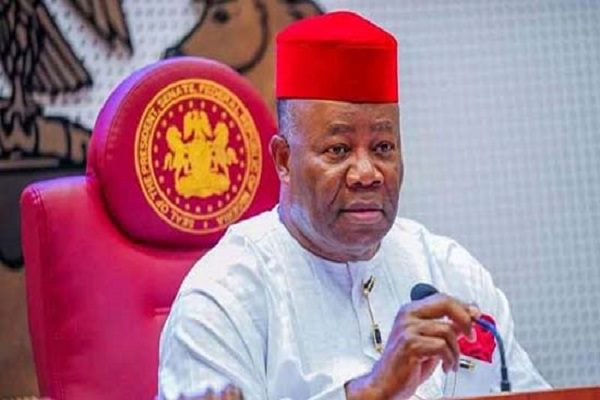The Senate President, Godswill Akpabio, expressed his approval for the formation of state police nationwide on Monday.
Akpabio showed his support in Abuja at a national policy dialogue on state policing organized by the House of Representatives Committee on Constitution Review.
The event, which drew the participation of prominent Nigerians including former military Head of State, Gen Abdulsalami Abubakar (retd), ex-President, Goodluck Jonathan, Metropolitan Catholic Archbishop of Abuja, Cardinal John Onaiyekan, and others, focused on the theme, “Pathways to peace: Re-imaging policing in Nigeria.”
Represented by the Deputy Senate President, Jibrin Barau, Akpabio assured the readiness of the 10th Assembly to address the challenges of insecurity in accordance with the focus of the President Bola Tinubu-led administration to ensure Nigeria's safety.
He mentioned, “The concept of state police has been a topic of debate for many years. It is a complex issue with no easy answers. But today, thanks to the House of Representatives, we have the opportunity to engage in a national dialogue, to listen to the voices of our fellow citizens, and to forge a path towards a more secure Nigeria. Let us seize this opportunity with open hearts and open minds. Let us listen to one another, learn from one another, and work together to find a common ground.
“President Tinubu did not only come to steady the ship of state, he came to adjust the sails and steer the ship of state through rough and fair weather, to the right direction and the right destination. He is known for rearranging the sails, and this is exactly what he has done in agreeing that modalities should be worked out for us to have state police.
“In working out modalities for the state police and the security of our nation, we must not forget that security is not a privilege, but a fundamental right of every Nigerian. It is our duty to ensure that this right is upheld, that justice is served, and that the rule of law prevails.
“We must build a security architecture that is robust, transparent, and accountable. If we are to establish state police departments, we must ensure that they are free from the chains of politics, religious extremism, tribalism, and ethnicity. We must empower them to serve and protect, without fear or favor.”
He noted that if established, state police must not be used for the fulfilment of private privileges, saying, “Let us never forget that the power of the state police should never be used as a tool of oppression or witch-hunting.
“Let us ensure that political powers do not manipulate the state police to silence dissent or target their enemies. Let us ensure that the influential do not exert undue influence over the state police and that justice is blind to wealth, power, politics, or status. Let us build a system that is fair, just, and equitable for all,” he added.
In his keynote address, Speaker of the House of Representatives, Abbas Tajudeen, said the role of the National Assembly in security law-making is to ensure that any initiative, such as establishing state policing “Adheres to our constitution and aligns with the broader goals of national security and public welfare.”
He said that the parliament doesn't have an opinion on state police, but their role is to help start a discussion and find agreements.
He added that making state police systems needs more than laws, it needs the whole country to agree on it. With Nigeria being diverse and complicated, there are different opinions on how to handle local policing.
The idea of state police involves giving more power to the states for policing, which can be better for each state. However, the 1999 Constitution says the Nigerian Police Force is supposed to be for the whole country.
Abbas said that the police's effectiveness has been affected by security and other problems. The military have had to do police work in all the States, including the Federal Capital Territory.
This has made the military do more work and has hurt their ability to deal with other big security problems, including ones that threaten Nigeria's territory.
The Deputy Speaker of the House of Representatives, Benjamin Kalu, said that over N5bn has been paid to kidnappers in the past eight years.
Kalu, who leads the House Committee on Constitution Review, stressed the need to change the 1999 Constitution to make a state police. He said the Nigeria Police Force has a lot of problems that stop it from working well.
He said that since 2016, estimates show that over ₦5bn have been paid to kidnappers, showing how much this crime has grown in the country.
The 2024 Global Terrorism Index says Nigeria is fourth in sub-saharan Africa and eighth in the world for countries most impacted by terrorism.
These facts show the urgent need for different levels of policing that focus on local security and make Nigeria's policing better.
People at the event supported state police, but warned that it must not be controlled by state governors for political reasons.
The Senate President, Godswill Akpabio, expressed his support for making state police across Nigeria during a policy discussion in Abuja. Many important Nigerians were at the event, including a former military Head of State.



